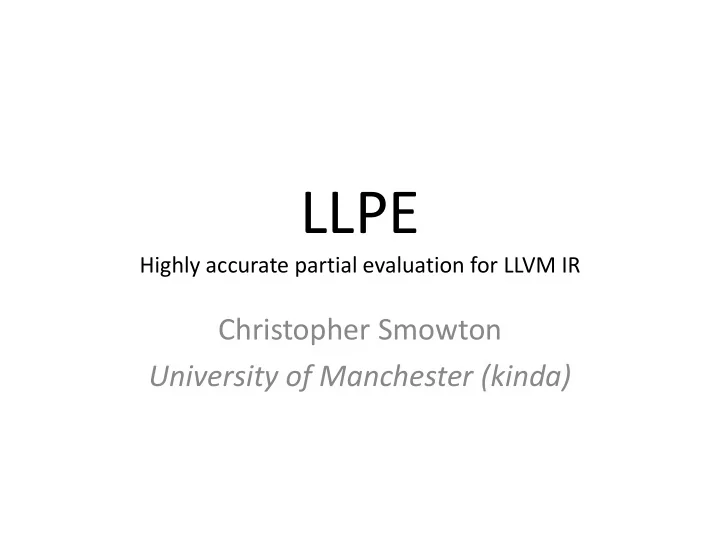

LLPE Highly accurate partial evaluation for LLVM IR Christopher Smowton University of Manchester (kinda)
LLPE • Partial evaluator / program specialiser for LLVM IR • Thus in effect a cross-module C/C++/FORTRAN/… PE • Supports 99% of IR (including e.g. funky reinterpret casts) • Specialises multithreaded programs, or those that interact with the kernel, or…
Overview • Quick review of PE • LLPE features • Practical Experience • LLVM: a good environment for PE? • LLPE current status
Review: Partial Evaluation (functional) f(x, y) = if x then y * 2 else y * 3 f_true(y) = y * 2
Review: Partial Evaluation (imperative) char get_checkbyte(const char* in, char init) { char checkbyte = init; for(int i = 0, ilim = strlen(in); i != ilim; ++i) checkbyte ^= in[i]; return checkbyte; } char get_checkbyte_LLPE(char init) { return init ^ ‘L’ ^ ‘L’ ^ ‘P’ ^ ‘E’; }
Review: Partial Evaluation (dealing with uncertainty) char* digest(const char* in, const char* algo) { if(!strcmp(algo , “MD5”)) return digest_md5(in); else if(!strcmp(algo , “SHA1”)) return digest_sha1(in); ... } i n = “LLPE”, algo = ?
Review: Partial Evaluation • Inline functions • Peel loop iterations • What to do when control flow is uncertain during specialisation? – Specialise both paths? – Stop specialising? – Ask the user?
LLPE: Features (Arithmetic and basic control) add 1, 1 br true, bb1, bb2 2 br bb1
LLPE: Features (Uncertain control flow) br ?, bb1, bb2 ... ... %x = phi(bb1 -> 1, bb2 -> 2) • %x gets a set value {1, 2} • Can’t emit this in the specialised program… • …but can use it to guide further specialisation
LLPE: Features (Calls and loops) • Non-recursive calls: always analyse in context (maximally context sensitive) • Potentially-unbounded loop or recursion: analyse in context if we are certain to enter the loop/call given the specialisation conditions • Otherwise find a fixed point solution.
LLPE Features (Memory) alloca i32 call malloc(...) Symbolic pointer @0 = i32 0 • Symbolic pointer arithmetic, comparison • Casts to integer types and back • Arbitrary pointer casts (e.g. i64 -> [i8 x 8]) • Can’t examine pointer bytes
LLPE Features (Memory) • Loads from symbolic pointers (or sets of symbolic pointers) can be resolved during specialisation • Stores write to symbolic memory; eliminated if all reading loads are eliminated • Symbolic memory merged at control-flow merge points
LLPE Features (I/O) call open(...) Symbolic FD • Results in a runtime check: file unchanged? • Check fails -> branch to unmodified code
LLPE Features (Threads and Processes) • Volatile or memory-ordering attributes indicate potential for concurrent interference: – By another thread – By another process – By a signal handler • By default, continue specialising but tag all memory as tentative . • Tentative loads require a runtime check
LLPE Features (limitations) • Broad IR support • Can’t specialise across a throw -> catch – Exception propagation introspects on the binary • Can’t specialise across inter -thread communicaton (only tolerate its incidental presence) • Can’t specialise across ASM sections with unbounded side-effects (but rare)
LLPE: Experiences • Specialised Nginx with respect to an XSLT document – Effectively “pre - compiling” part of the transform – 30% speedup when requesting a doc using that XSLT sheet; negligible impact when requesting a different document • Pared Nginx by “baking in” a particular config – Reduced binary size by 30%
LLPE: Experiences • Efficiency (time, space) a concern – Around 10,000 : 1 slowdown relative to conventional execution, but unoptimised • User assistance minimal – Around 20 directives to successfully specialise Nginx • Annotating TLS • Annotating bounded loops
LLPE: Experiences • Still “hits the wall” when confronted with a write-through-unknown-pointer • Value sets and vague pointers designed to minimise writes through unknown
LLVM: A Good Place to PE • Fully-linked image with rich semantic information • Dodges shortcomings of C language – Implementation-defined behaviour • Rich toolbox of primitive manipulations
LLVM: A Bad Place to PE • Uniqued Constants drove me to copy-paste the guts of the constant folder • Inability to keep LoopInfo alive for many functions at once was a pain • Would be nice to get the IR printout in structured form, for debugging • Ultimately minor complaints; A+++ would develop again
Current Status • 95% feature complete – A few missing corner cases, e.g. mutually recursive functions • Functioning version for LLVM 3.2 • Forward port to LLVM 3.6 • Code rationalisation; developer documentation in progress (ETA 1 month)
www.llpe.org • Forums / mailing lists • Bug tracker • Github repo
Recommend
More recommend